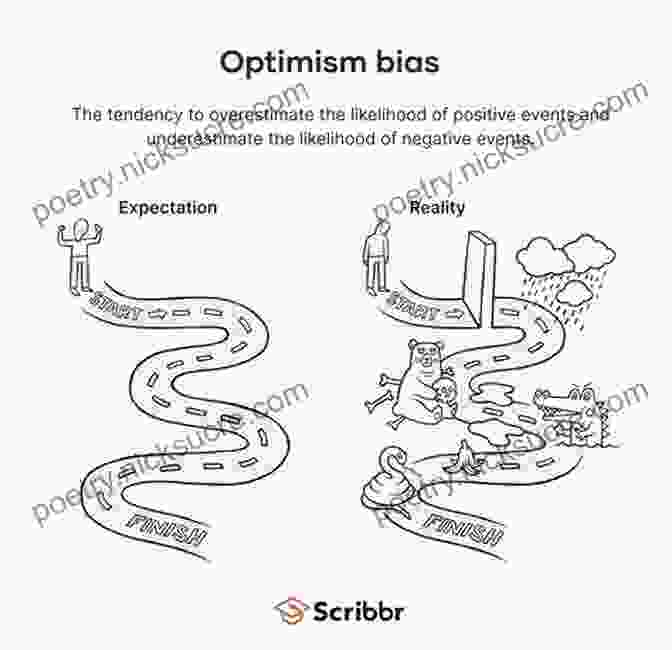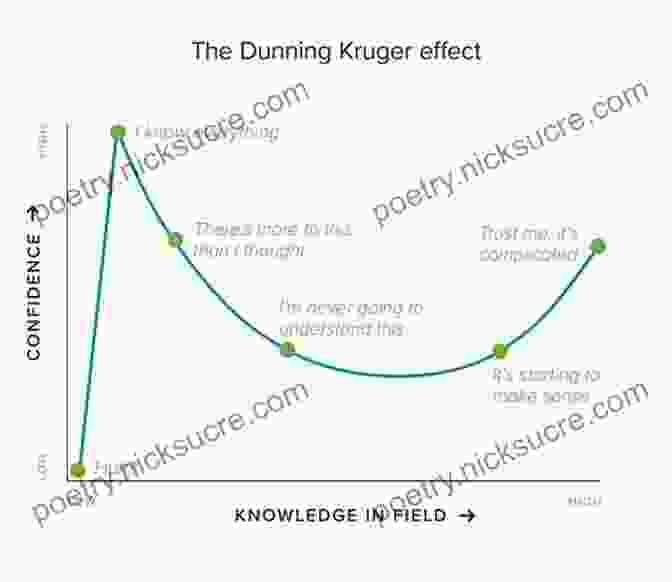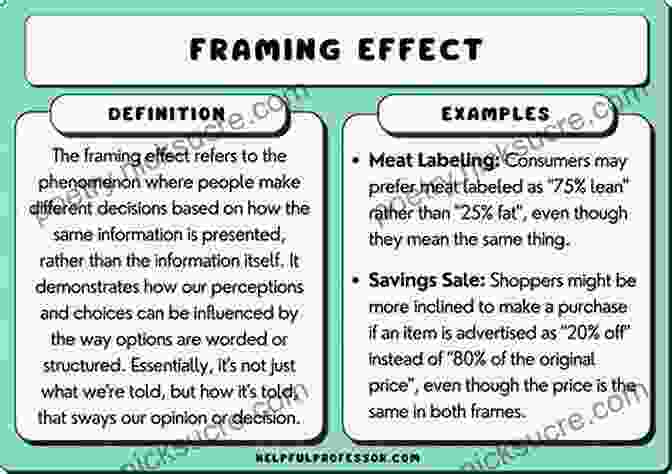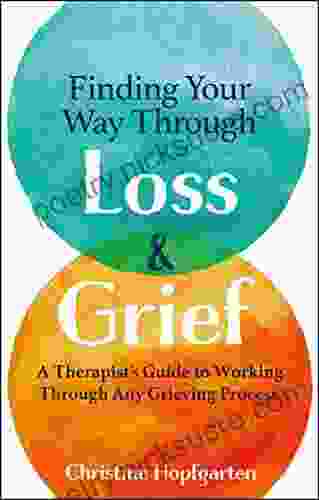Tour of the Irrationally Positive Brain: Understanding Our Cognitive Biases

The human brain is a marvel of biological engineering. It allows us to perceive the world around us, make complex decisions, and experience a vast array of emotions. However, this remarkable organ is not immune to imperfections. One of the most fascinating aspects of the human brain is its tendency to exhibit irrationality in its thought processes and decision-making.
4.5 out of 5
| Language | : | English |
| File size | : | 643 KB |
| Text-to-Speech | : | Enabled |
| Enhanced typesetting | : | Enabled |
| Word Wise | : | Enabled |
| Print length | : | 272 pages |
| Screen Reader | : | Supported |
Cognitive biases are systematic errors in thinking that occur when the brain takes mental shortcuts to process information and make decisions. These biases can lead us to make irrational choices, misjudge situations, and hold inaccurate beliefs.
In this article, we will embark on a tour of the irrationally positive brain, exploring some of the most common cognitive biases that shape our perceptions and decision-making. We will delve into the fascinating world of our irrational tendencies and discover strategies for making more rational choices.
Cognitive Biases: A Trip Through the Irrational Mind
Cognitive biases are pervasive in our thinking and decision-making. They arise from various psychological factors, including our limited cognitive resources, our tendency to rely on heuristics (mental shortcuts),and our emotional state.
Let's take a closer look at some of the most prevalent cognitive biases:
Optimism Bias
The optimism bias is the tendency to overestimate the likelihood of positive events and underestimate the likelihood of negative events. This bias can lead us to make unrealistic plans, take unnecessary risks, and fail to prepare for potential setbacks.

Confirmation Bias
Confirmation bias refers to the tendency to seek out and interpret information that confirms our existing beliefs and ignore or discount information that contradicts them. This bias can lead us to become entrenched in our views, even when presented with evidence that challenges them.

Dunning-Kruger Effect
The Dunning-Kruger effect describes the phenomenon where people with low levels of knowledge or competence in a particular area tend to overestimate their own abilities and knowledge.

Framing Effect
The framing effect refers to the tendency for people to make different decisions depending on how options are presented or framed. This bias can be influenced by the way information is presented, the language used, and the context in which choices are made.

Implications of Cognitive Biases
Cognitive biases have significant implications for our lives. They can lead to:
- Irrational decision-making
- Misjudgments and errors
- False beliefs and inaccurate perceptions
- Cognitive dissonance and psychological discomfort
- Polarization and conflict
Understanding the presence of cognitive biases in our thinking is crucial for making more rational choices. It allows us to be aware of our limitations and take steps to mitigate the impact of these biases on our decisions.
Strategies for Overcoming Cognitive Biases
While it is impossible to eliminate cognitive biases entirely, there are strategies we can employ to minimize their impact on our thinking and decision-making:
Be Aware of Your Biases
The first step to overcoming cognitive biases is to be aware of their existence. By recognizing when we are likely to be influenced by biases, we can take steps to avoid or minimize their impact.
Seek Diverse Perspectives
Surrounding ourselves with people who hold different viewpoints can help challenge our assumptions and broaden our perspectives. Exposing ourselves to diverse opinions can help us identify and correct cognitive biases.
Use Critical Thinking Skills
Developing critical thinking skills is essential for overcoming cognitive biases. This involves objectively evaluating information, considering multiple perspectives, and avoiding emotional reasoning.
Practice Mindfulness
Mindfulness can help us become more aware of our thoughts and feelings. This awareness allows us to identify and challenge cognitive biases when they arise.
Use Cognitive Tools and Techniques
Various cognitive tools and techniques can help us overcome cognitive biases. These include decision matrices, checklists, and scenario analysis.
The human brain is a marvel of complexity and ingenuity, but it is not immune to irrationality. Cognitive biases are pervasive in our thinking and decision-making, and they can lead to a range of negative consequences.
By understanding the nature of cognitive biases and employing strategies to overcome them, we can make more rational choices, avoid errors in judgment, and cultivate a more accurate and realistic view of the world. The tour of the irrationally positive brain is a journey of self-discovery and cognitive empowerment. It is a journey that can help us unlock the full potential of our rational minds.
4.5 out of 5
| Language | : | English |
| File size | : | 643 KB |
| Text-to-Speech | : | Enabled |
| Enhanced typesetting | : | Enabled |
| Word Wise | : | Enabled |
| Print length | : | 272 pages |
| Screen Reader | : | Supported |
Do you want to contribute by writing guest posts on this blog?
Please contact us and send us a resume of previous articles that you have written.
 Fiction
Fiction Non Fiction
Non Fiction Romance
Romance Mystery
Mystery Thriller
Thriller SciFi
SciFi Fantasy
Fantasy Horror
Horror Biography
Biography Selfhelp
Selfhelp Business
Business History
History Classics
Classics Poetry
Poetry Childrens
Childrens Young Adult
Young Adult Educational
Educational Cooking
Cooking Travel
Travel Lifestyle
Lifestyle Spirituality
Spirituality Health
Health Fitness
Fitness Technology
Technology Science
Science Arts
Arts Crafts
Crafts DIY
DIY Gardening
Gardening Petcare
Petcare John Dunn
John Dunn Hill Harper
Hill Harper Robby Weber
Robby Weber Pawel Malczewski
Pawel Malczewski Neel Doshi
Neel Doshi L A Cotton
L A Cotton Krista Marson
Krista Marson Sally Annjanece Stevens
Sally Annjanece Stevens Chase Hassen
Chase Hassen Shannon Vallor
Shannon Vallor Michael Tan
Michael Tan Jemar Tisby
Jemar Tisby Zach Hunter
Zach Hunter Joey Myers
Joey Myers Annaka Harris
Annaka Harris Michael Burnett
Michael Burnett Bob Cary
Bob Cary Jack Perconte
Jack Perconte Steven Yellin
Steven Yellin Eddie Jones
Eddie Jones John Dickson
John Dickson Anna Bright
Anna Bright Jenny Jacobs
Jenny Jacobs Suzanne I Barchers
Suzanne I Barchers Jonathan Pd Buckley
Jonathan Pd Buckley J E Esslemont
J E Esslemont Kass Morgan
Kass Morgan Holly Chism
Holly Chism Charles J Sanders
Charles J Sanders Christopher Seddon
Christopher Seddon Sukhveer Singh
Sukhveer Singh Kathy Morey
Kathy Morey Tim Cahill
Tim Cahill Damian Hall
Damian Hall R K Agarwal
R K Agarwal Steve Olson
Steve Olson Craig Ramsay
Craig Ramsay Katie Krimer Ma Lcsw
Katie Krimer Ma Lcsw Linda Lewis Alexander
Linda Lewis Alexander Scott P Sells
Scott P Sells Randall Fitzgerald
Randall Fitzgerald Robert A Cook
Robert A Cook Boye Lafayette De Mente
Boye Lafayette De Mente E R Truitt
E R Truitt Zoe Moore
Zoe Moore L Chapman
L Chapman Jackson Carter
Jackson Carter Sajni Patel
Sajni Patel M Shawn Copeland
M Shawn Copeland Genevieve Mckay
Genevieve Mckay Shawn Shallow
Shawn Shallow Anna Grafl
Anna Grafl Jennifer Dugan
Jennifer Dugan Steve Schwartz
Steve Schwartz M Terese Verklan
M Terese Verklan Graham Robb
Graham Robb Michael G Manning
Michael G Manning Sparknotes
Sparknotes Ben Shneiderman
Ben Shneiderman Vladimir Vasiliev
Vladimir Vasiliev Josephine Mccarthy
Josephine Mccarthy Mark Mckinney
Mark Mckinney Worley Faver
Worley Faver Nicholas Thomas
Nicholas Thomas Chris Fregly
Chris Fregly Dave Hughes
Dave Hughes Wendy Leo Smith
Wendy Leo Smith Morton Manus
Morton Manus J Scott Long
J Scott Long Nicholas Clapp
Nicholas Clapp Annabel Streets
Annabel Streets Melissa Mortenson
Melissa Mortenson Carl Mckeating
Carl Mckeating Marva Boatman
Marva Boatman Emily J Taylor
Emily J Taylor Caryl Phillips
Caryl Phillips Philip Gibson
Philip Gibson Jenn Bennett
Jenn Bennett Stacey A Shannon
Stacey A Shannon Hanumant Deshmukh
Hanumant Deshmukh G Norman Lippert
G Norman Lippert Sean Purchase
Sean Purchase Anna Watson
Anna Watson Sandy Camillo
Sandy Camillo Jessa Stone
Jessa Stone John Van Wyhe
John Van Wyhe Margaret Jean Langstaff
Margaret Jean Langstaff Lizzie Collingham
Lizzie Collingham William Goldman
William Goldman Mikael Lindnord
Mikael Lindnord June Hur
June Hur Nancy Marie White
Nancy Marie White Steven Munatones
Steven Munatones Louise Katz
Louise Katz Maya Van Wagenen
Maya Van Wagenen Ann Valett
Ann Valett Earl Hipp
Earl Hipp Omari Bouknight
Omari Bouknight Jay Young
Jay Young Robert F Boszhardt
Robert F Boszhardt Patricia Ladis
Patricia Ladis Valerie Hansen
Valerie Hansen Stephen J Pyne
Stephen J Pyne James C Zimring
James C Zimring Johnny Chuong
Johnny Chuong Gilbert J Grant Md
Gilbert J Grant Md Philip Reed
Philip Reed Matthew Locricchio
Matthew Locricchio Kate Mcvaugh
Kate Mcvaugh Clive Scarff
Clive Scarff Kendall Coyne
Kendall Coyne Dave Hall
Dave Hall Richard C Schwartz
Richard C Schwartz John O Sullivan
John O Sullivan Thomas A Garrity
Thomas A Garrity Malcolm S Thaler
Malcolm S Thaler Anna B Doe
Anna B Doe Monroe Wildrose
Monroe Wildrose Mishka Shubaly
Mishka Shubaly Matthew Cobb
Matthew Cobb Richard A Swanson
Richard A Swanson Darryl Belfry
Darryl Belfry Isaac Fitzsimons
Isaac Fitzsimons College Hippo
College Hippo Tim Young
Tim Young Sara Wickham
Sara Wickham Jacqueline Winslow
Jacqueline Winslow Dorothy Ours
Dorothy Ours R A Salvatore
R A Salvatore Sam Demas
Sam Demas Ray Moynihan
Ray Moynihan Bruce Lockwood
Bruce Lockwood Dave Canterbury
Dave Canterbury Kristian Berg
Kristian Berg Adele Faber
Adele Faber Daphne Poltz
Daphne Poltz Arcturus Publishing
Arcturus Publishing Sheela Raja
Sheela Raja Alexander L Chapman
Alexander L Chapman Paul Logothetis
Paul Logothetis Claire Walter
Claire Walter Ray Eye
Ray Eye Stacey Williams
Stacey Williams Barry Dainton
Barry Dainton Karen Bassie Sweet
Karen Bassie Sweet Bernard Stiegler
Bernard Stiegler Kristen L Mauk
Kristen L Mauk Gloria Chadwick
Gloria Chadwick Junior Health Institute
Junior Health Institute Zach Codings
Zach Codings Tyler Richards
Tyler Richards Steve Grant
Steve Grant Pierluigi Barrotta
Pierluigi Barrotta Margaret Rogerson
Margaret Rogerson Ann Marie Brown
Ann Marie Brown Mary E Pearson
Mary E Pearson Helen Adrienne
Helen Adrienne Donna D Ignatavicius
Donna D Ignatavicius Cb Droege
Cb Droege Winton Porter
Winton Porter Tali Sharot
Tali Sharot Anna Flores Locke
Anna Flores Locke Steve Oldenburg
Steve Oldenburg Scott Allan
Scott Allan Barry Schwartz
Barry Schwartz Gary Chapman
Gary Chapman Richard A Ruth
Richard A Ruth Charlene Beswick
Charlene Beswick Marjorie Savage
Marjorie Savage Roy M Wallack
Roy M Wallack Stephanie Cave
Stephanie Cave Curtis Collins
Curtis Collins Dave Whitlock
Dave Whitlock Sally Black
Sally Black Eric Greitens
Eric Greitens Ford R Bryan
Ford R Bryan Katharine Beals
Katharine Beals Fox Fisher
Fox Fisher Emmett W Hines
Emmett W Hines Joe Hyams
Joe Hyams Steven A Fino
Steven A Fino Anna Lowenhaupt Tsing
Anna Lowenhaupt Tsing Ann Voskamp
Ann Voskamp Anna Quindlen
Anna Quindlen Asker Jeukendrup
Asker Jeukendrup Margaret Paul
Margaret Paul Henry Dillon
Henry Dillon Ling Seto
Ling Seto Janine Marsh
Janine Marsh Lexi Ryan
Lexi Ryan Jonathan R Brennan
Jonathan R Brennan James C Scott
James C Scott Gill James
Gill James Lori L Tharps
Lori L Tharps Christelle Dabos
Christelle Dabos Steven G Krantz
Steven G Krantz Becky Wade
Becky Wade Nisha Garg
Nisha Garg Maggie Downs
Maggie Downs Larry Thornberry
Larry Thornberry John Yates
John Yates John Murray
John Murray Daniel Isberner
Daniel Isberner Gwen Mckee
Gwen Mckee Mike Reilly
Mike Reilly Anna Wood
Anna Wood Paul Mendelson
Paul Mendelson Scott Shupe
Scott Shupe Jay Allan
Jay Allan Neal Shusterman
Neal Shusterman Richard Appleton
Richard Appleton Mike Roberts
Mike Roberts Robert A Conover
Robert A Conover Peter Wacht
Peter Wacht Kennedy Achille
Kennedy Achille Robin Esrock
Robin Esrock Christine Field
Christine Field Michael Labossiere
Michael Labossiere Jason
Jason Ann Zaprazny
Ann Zaprazny David Soucie
David Soucie Naomi Tomky
Naomi Tomky David Berry
David Berry Vittal S Anantatmula
Vittal S Anantatmula David Woods
David Woods Guy Windsor
Guy Windsor Jackie Bolen
Jackie Bolen Patrick Torsell
Patrick Torsell Danny Jones
Danny Jones Larry Semento
Larry Semento William P Young
William P Young Helen E Lees
Helen E Lees Marie Cirano
Marie Cirano Chris Gore
Chris Gore Luke Schumacher
Luke Schumacher Laurie Varga
Laurie Varga Steve Bowkett
Steve Bowkett Harnarayan Singh
Harnarayan Singh Lisa Randall
Lisa Randall Creative Guy
Creative Guy P M Gilbert
P M Gilbert George Lakoff
George Lakoff Mark Matlock
Mark Matlock Brian Daccord
Brian Daccord Joyce Meyer
Joyce Meyer W W Sawyer
W W Sawyer Peter Hathaway Capstick
Peter Hathaway Capstick Jennifer L Lopez
Jennifer L Lopez Geoff Greig
Geoff Greig Ellen Dugan
Ellen Dugan Lina Beard
Lina Beard Sally Connolly
Sally Connolly Stefanie Japel
Stefanie Japel Barak A Bassman
Barak A Bassman Alex Bromley
Alex Bromley Peter Richmond
Peter Richmond Dan Koboldt
Dan Koboldt Heidi Kreider
Heidi Kreider Ralph Cockburn
Ralph Cockburn Steve Newell
Steve Newell Nelson Dellis
Nelson Dellis Zach Davis
Zach Davis John Edwards
John Edwards Julie A Ross
Julie A Ross Susan M Schneider
Susan M Schneider Rick Page
Rick Page Chronicle Books
Chronicle Books Sarah Stodola
Sarah Stodola Glen E Clarke
Glen E Clarke Walter Mischel
Walter Mischel John Gignilliat
John Gignilliat Adil E Shamoo
Adil E Shamoo Sherry B Ortner
Sherry B Ortner Wayne C Booth
Wayne C Booth Kalman Samuels
Kalman Samuels H Jerome Chapman
H Jerome Chapman Lisa Manterfield
Lisa Manterfield Pradeepa Narayanaswamy
Pradeepa Narayanaswamy Darcie Little Badger
Darcie Little Badger Sean Covey
Sean Covey Jill Lepore
Jill Lepore C W Farnsworth
C W Farnsworth Eleanor J Sullivan
Eleanor J Sullivan Miley Smiley
Miley Smiley Todd Radom
Todd Radom Anna Ivey
Anna Ivey Good Books
Good Books James Burke
James Burke Julie Plagens
Julie Plagens Sharon Rowley
Sharon Rowley Kristina Cowan
Kristina Cowan Douglas Perry
Douglas Perry Julie Creffield
Julie Creffield Harley Mcallister
Harley Mcallister Jennifer Kostick
Jennifer Kostick Stuart Tomlinson
Stuart Tomlinson Rick Sparkman
Rick Sparkman John Pullen
John Pullen Cathy Glass
Cathy Glass Christina Henry De Tessan
Christina Henry De Tessan Stefan Hollos
Stefan Hollos Ken Robinson
Ken Robinson Hannah Testa
Hannah Testa Angela Saini
Angela Saini Barb Musick
Barb Musick Joanna Wells
Joanna Wells James F Twyman
James F Twyman Tara Haelle
Tara Haelle Peter Watson
Peter Watson Antonio Robert
Antonio Robert Julian Havil
Julian Havil Linda K Miller
Linda K Miller Anne Sylvie Malbrancke
Anne Sylvie Malbrancke Noel D Justice
Noel D Justice Dante Fortson
Dante Fortson Ann Mccallum Staats
Ann Mccallum Staats Illustrated Edition Kindle Edition
Illustrated Edition Kindle Edition Buddy Lee
Buddy Lee Dr Harper
Dr Harper Melanie Dickerson
Melanie Dickerson Peyton Curley
Peyton Curley Todd Denault
Todd Denault Stan Gibilisco
Stan Gibilisco Jonathan Franklin
Jonathan Franklin Richard Mcafee
Richard Mcafee Roger Hall
Roger Hall Roy R Grinker
Roy R Grinker Julian Of Norwich
Julian Of Norwich Tanmay Mehta
Tanmay Mehta Oskar Morgenstern
Oskar Morgenstern Holly Bourne
Holly Bourne Susan Straub
Susan Straub Elisabeth Haich
Elisabeth Haich Randy J Paterson
Randy J Paterson Anna Crowley Redding
Anna Crowley Redding Dannah Gresh
Dannah Gresh Timothy P Schultz
Timothy P Schultz Harold Davis
Harold Davis Lily Siou
Lily Siou Robert Gerver
Robert Gerver Judy Corry
Judy Corry Lily Dunn
Lily Dunn Elizabeth Wissner Gross
Elizabeth Wissner Gross Bella Forrest
Bella Forrest Quinn Loftis
Quinn Loftis Sean Bartram
Sean Bartram Louis Van Dyke
Louis Van Dyke Silvia M Lindtner
Silvia M Lindtner Livia Bitton Jackson
Livia Bitton Jackson Rutger Bregman
Rutger Bregman The Pinnacle Review
The Pinnacle Review Ralph Waldo Emerson
Ralph Waldo Emerson Skeleton Steve
Skeleton Steve Freddy Silva
Freddy Silva Paulo Guillobel
Paulo Guillobel Seth Stephens Davidowitz
Seth Stephens Davidowitz Les Livingstone
Les Livingstone Chris Bailey
Chris Bailey Justine Gregory Williams
Justine Gregory Williams Cade Courtley
Cade Courtley Matthew Rudy
Matthew Rudy Tarani Chandola
Tarani Chandola Jenna Evans Welch
Jenna Evans Welch C J Brown
C J Brown Hope Comerford
Hope Comerford Zena Hitz
Zena Hitz Trevor Hartman
Trevor Hartman Chic Scott
Chic Scott Jacob Ward
Jacob Ward Joshua Shifrin
Joshua Shifrin Stephen Tarsitano
Stephen Tarsitano Bob Madgic
Bob Madgic Martin N Seif
Martin N Seif Frank Thomas
Frank Thomas Charles Dickens
Charles Dickens Susan G Solomon
Susan G Solomon Rebecca Carroll
Rebecca Carroll Sharman Apt Russell
Sharman Apt Russell Peter L Falkingham
Peter L Falkingham Barbara Sealock
Barbara Sealock Dan Vogel
Dan Vogel Ichigo Takano
Ichigo Takano Horace Kephart
Horace Kephart Joy Dawson
Joy Dawson Finn Aagaard
Finn Aagaard Illysa R Foster
Illysa R Foster Geryn Childress
Geryn Childress Mordecai Orimiladeye
Mordecai Orimiladeye Howard Means
Howard Means Ruby Mcconnell
Ruby Mcconnell Bob Labbe
Bob Labbe Bert Mendelson
Bert Mendelson H M Schey
H M Schey James P Sethna
James P Sethna Annette Burns
Annette Burns Christine Hopfgarten
Christine Hopfgarten Ellen Painter Dollar
Ellen Painter Dollar Suzanne Clark
Suzanne Clark George James Grinnell
George James Grinnell Jay Spence
Jay Spence Julia Galef
Julia Galef Suzanne Girard Eberle
Suzanne Girard Eberle Timothy Ellis
Timothy Ellis Caroline Miller
Caroline Miller Steven Callahan
Steven Callahan Dean Buonomano
Dean Buonomano Ian Moulding
Ian Moulding Anna Della Subin
Anna Della Subin Gemma Bray
Gemma Bray Annalyn Ng
Annalyn Ng L J Smith
L J Smith Michael Witwer
Michael Witwer Susan Spicer
Susan Spicer Michael F Nenes
Michael F Nenes Victor Stringer
Victor Stringer Breeda Bermingham
Breeda Bermingham Jeff Kuehl
Jeff Kuehl Paul Bloom
Paul Bloom Ariel Dalfen
Ariel Dalfen Dan Gardner
Dan Gardner Helge Kragh
Helge Kragh L J Martin
L J Martin Bren Smith
Bren Smith Tony Osgood
Tony Osgood Dr Sarita Uhr
Dr Sarita Uhr Julie C Meloni
Julie C Meloni Rebecca A Moyes
Rebecca A Moyes Crystal Cook
Crystal Cook Lane Demas
Lane Demas Christopher T Coughlin
Christopher T Coughlin Kyung Won Chung
Kyung Won Chung Will Kurt
Will Kurt Melvin Fitting
Melvin Fitting Reinhard Kleist
Reinhard Kleist Shelley Emling
Shelley Emling Bethany Saltman
Bethany Saltman Michael Hodgson
Michael Hodgson Sandy Bodeau
Sandy Bodeau Frances Schultz
Frances Schultz Sara Dyer
Sara Dyer Jean Barbre
Jean Barbre Martin Meredith
Martin Meredith John Baichtal
John Baichtal Fumio Sasaki
Fumio Sasaki Dana James
Dana James Aaron Mahnke
Aaron Mahnke Patricia Romanowski Bashe
Patricia Romanowski Bashe Horace Freeland Judson
Horace Freeland Judson Prime Hall
Prime Hall Steve Bennett
Steve Bennett
Light bulbAdvertise smarter! Our strategic ad space ensures maximum exposure. Reserve your spot today!

 Ezekiel CoxThe Purpose Driven Teenager: Uncovering Your Life's Mission and Living It Out...
Ezekiel CoxThe Purpose Driven Teenager: Uncovering Your Life's Mission and Living It Out...
 Orson Scott CardThe League of Invisible Men: Growing Up Rural and the Search for Belonging
Orson Scott CardThe League of Invisible Men: Growing Up Rural and the Search for Belonging
 Randy HayesThe Quest for the Origins of Human Life: Unveiling the Enigmatic Tapestry of...
Randy HayesThe Quest for the Origins of Human Life: Unveiling the Enigmatic Tapestry of...
 Jessie CoxThe Young Chef Cookbook: The Complete Cooking Guide for Kids Who Love to Cook...
Jessie CoxThe Young Chef Cookbook: The Complete Cooking Guide for Kids Who Love to Cook... Joel MitchellFollow ·11.2k
Joel MitchellFollow ·11.2k Reginald CoxFollow ·5k
Reginald CoxFollow ·5k Arthur MasonFollow ·6.6k
Arthur MasonFollow ·6.6k Jacques BellFollow ·14.5k
Jacques BellFollow ·14.5k Forrest ReedFollow ·16.8k
Forrest ReedFollow ·16.8k Jack ButlerFollow ·19.3k
Jack ButlerFollow ·19.3k Miguel de CervantesFollow ·11.9k
Miguel de CervantesFollow ·11.9k Jayden CoxFollow ·2.1k
Jayden CoxFollow ·2.1k

 Aldous Huxley
Aldous HuxleyMorgenstern: A Classic Tale of True Love and High...
Morgenstern is a...

 Beau Carter
Beau CarterThe Oasis Guide to Asperger Syndrome
What is Asperger Syndrome? Asperger...

 Chadwick Powell
Chadwick PowellFinding Your Way Through Loss Grief: A Therapist S Guide...
Grief is a natural human emotion that we...
4.5 out of 5
| Language | : | English |
| File size | : | 643 KB |
| Text-to-Speech | : | Enabled |
| Enhanced typesetting | : | Enabled |
| Word Wise | : | Enabled |
| Print length | : | 272 pages |
| Screen Reader | : | Supported |










